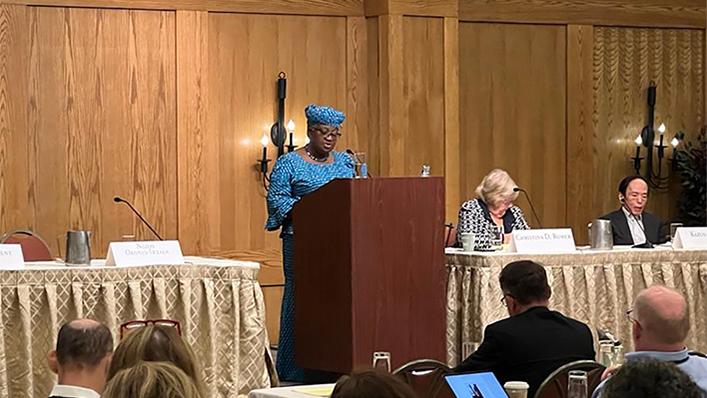
Speaking at the annual Jackson Hole Economic Policy Symposium hosted by the Federal Reserve Bank of Kansas City, the Director-General said predictable trade is a source of disinflationary pressure, reduced volatility, and increased economic resilience whereas fragmentation of trade into rival blocs “would be very costly.”
“A world that turns its back on open and predictable trade will be one marked by diminished competitive pressures and greater price volatility,” the Director-General warned. “It would be a world of weaker growth and development prospects, a slower low-carbon transition, and increased supply vulnerability in the face of unexpected shocks.”
Sustained inflation has made a comeback across the rich world, with subsequent monetary tightening exacerbating debt distress and financial instability for dozens of developing economies, she noted. Some policymakers have looked at these shocks, alongside rising geopolitical tensions, and concluded that globalization needs to be rolled back.
However, WTO economists estimate that if the world economy decouples into two self-contained trading blocs, this would lower the long-run level of real global GDP by at least 5 per cent, with some developing economies facing double-digit welfare losses.
Despite all the tensions and scepticism around trade, overall trade costs for agricultural products, manufactured goods, and services have actually fallen by 12 per cent over the past 20 years, with the increased digitalization and trade in services potentially becoming a powerful disinflationary force.
“Falling trade costs for goods and especially for services mean that globalization can still be an engine for increased growth, efficiency, and economic opportunities, while also contributing to price moderation,” the Director-General declared.
In particular, increased digitalization and trade in services boosted by initiatives such as the agreement on Services Domestic Regulation, concluded by WTO members accounting for over 90 per cent per cent of global services trade, and the ongoing talks on electronic commerce now being negotiated among 90 WTO members, “could become a powerful disinflationary force,” she noted.
“Seizing these opportunities requires open and predictable international markets, anchored in a strong and effective rules-based multilateral trading system.”
Rather than deglobalization, “there is a strong case for diverting some of the energy behind reshoring to re-globalizing production instead,” she told the Symposium. Some evidence of re-globalization is already visible with countries like Vietnam, Cambodia, Romania, Morocco, and Turkey sharply increasing their participation in value chains across a range of goods and services.
“Today, as businesses recalibrate how they think about scale efficiencies versus concentration risks, they have an opportunity to bolster supply chain resilience by taking this diversification process further, to encompass more places in Africa, Asia and Latin America that have good macroeconomic fundamentals but remain stuck on the margins of the global division of labour.”
“Re-globalization is a far better alternative,” DG Okonjo-Iweala told the gathered economic leaders. “I ask all of you to speak up for open trade, multilateral cooperation, and the WTO. Doing so might even end up making your jobs a bit easier.”
Share
Reach us to explore global export and import deals